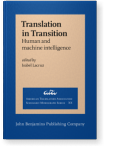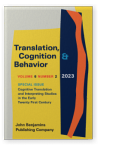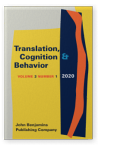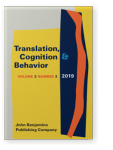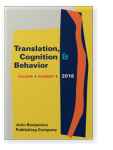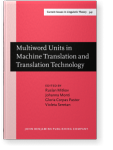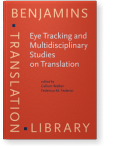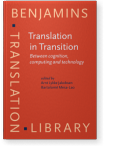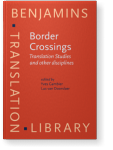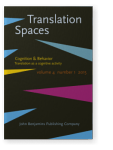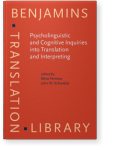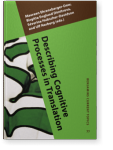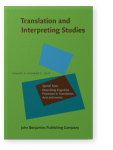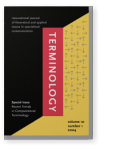Michael Carl
List of John Benjamins publications for which Michael Carl plays a role.
2023 Chapter 12. The Monitor Model and its misconceptions: A clarification Translation in Transition: Human and machine intelligence, Lacruz, Isabel (ed.), pp. 257–281 | Chapter
Horizontal (automatic) and vertical (control) processes have been observed and reported for a long time in translation production. Schaeffer and Carl’s Monitor Model integrates these two processes into one framework, assuming that priming mechanisms underlie horizontal/automatic processes, while… read more
2023 Empirical translation process research: Past and possible future perspectives Cognitive Translation and Interpreting Studies in the Early Twenty First Century, García, Adolfo M., Edinson Muñoz and Néstor Singer (eds.), pp. 252–274 | Article
Over the last four decades, considerable efforts have been devoted to the modeling and evaluation of human translation processes. This article takes a closer look at the evolution of empirical Translation Process Research (TPR) within the CRITT TPR-DB tradition. It contends that human… read more
2023 Chapter 10. Impact of word alignment on word translation entropy and other metrics: A comparison of translation process research findings derived from different word alignment methods Translation in Transition: Human and machine intelligence, Lacruz, Isabel (ed.), pp. 203–235 | Chapter
Many of the findings from studies using the Center for Research and Innovation in Translation and Translation Technology (CRITT) Translation Process Research Database (TPR-DB) framework rely on word(s)-to-word(s) alignments of the source text and target text. However, little research has been… read more
2023 Chapter 8. Economy and efficiency of note-taking in consecutive interpreting from English to Chinese: A study on Ear-Pen Span, Note-Taking Duration, Units, and Quality Translation in Transition: Human and machine intelligence, Lacruz, Isabel (ed.), pp. 157–182 | Chapter
Note-taking serves an important memory-supporting role in consecutive interpreting. It greatly facilitates the reproduction of the same message in another language. Previous research mainly focused on note-taking and interpreting performance but studies failed to reach consensus on whether and… read more
2020 Predicting translation behaviors by using Hidden Markov Model Translation, Cognition & Behavior 3:1, pp. 76–99 | Article
The translation process can be studied as sequences of activity units. The application of machine learning technology offers researchers new possibilities in the study of the translation process. This research project developed a program, activity unit predictor, using the Hidden Markov Model.… read more
2019 A systems theory perspective on the translation process Translation, Cognition & Behavior 2:2, pp. 211–232 | Article
The translation process has often been described as a sequence of three steps, source text (ST) analysis, source-target transfer, and target text (TT) generation. We propose a radically different view, in which the human translation process consists of a hierarchy of interacting word and phrase… read more
2018 The development of the TPR-DB as Grounded Theory Method Translation, Cognition & Behavior 1:1, pp. 168–193 | Article
Initial versions of the translation process research database (TPR-DB), were released around 2011 in an attempt to integrate translation process data from several until then individually collected and scattered translation research projects. While the earlier individual studies had a clear focus… read more
2018 How do students cope with machine translation output of multiword units? An exploratory study Multiword Units in Machine Translation and Translation Technology, Mitkov, Ruslan, Johanna Monti, Gloria Corpas Pastor and Violeta Seretan (eds.), pp. 61–80 | Chapter
In this chapter, we take a closer look at students’ post-editing of multiword units (MWUs) from English into Dutch. The data consists of newspaper articles post-edited by translation students as collected by means of advanced keystroke logging tools.We discuss the quality of the machine translation… read more
2018 Chapter 6. Recognition and characterization of translator attributes using sequences of fixations and keystrokes Eye Tracking and Multidisciplinary Studies on Translation, Walker, Callum and Federico M. Federici (eds.), pp. 97–120 | Chapter
As the demand for high quality translation continues to increase, there is a growing interest in developing effective computer-assisted tools that support translators in their routines. However, the development of such tools requires a deeper understanding of the translation process that allows us… read more
2017 Chapter 3. Measuring translation literality Translation in Transition: Between cognition, computing and technology, Jakobsen, Arnt Lykke and Bartolomé Mesa-Lao (eds.), pp. 81–105 | Chapter
Tirkkonen-Condit (2005: 407–408) argues that “It looks as if literal translation is [the result of] a default rendering procedure”. As a corollary, more literal translations should be easier to process, and less literal ones should be associated with more cognitive effort. In order to assess this… read more
2016 Computational linguistics and translation studies: Methods and models Border Crossings: Translation Studies and other disciplines, Gambier, Yves and Luc van Doorslaer (eds.), pp. 225–244 | Article
Translation process research is an active interdisciplinary research area within
translation studies attracting translation scholars, computer scientists and the
machine learning community alike. Novel data acquisition methods have been
developed in recent years leading to large sets of translation… read more
2015 The role of syntactic variation in translation and post-editing Translation as a cognitive activity, Alves, Fabio, Amparo Hurtado Albir and Isabel Lacruz (eds.), pp. 119–144 | Article
2015 Post-editing machine translation: A usability test for professional translation settings Psycholinguistic and Cognitive Inquiries into Translation and Interpreting, Ferreira, Aline and John W. Schwieter (eds.), pp. 145–174 | Article
Traditionally, the quality of machine translation (MT) output at best was sufficient to serve as an informative translation for users without any knowledge of the source language but not for the purpose of professional translation. However, still restricted to limited scenarios dependent on… read more
2015 Shared representations and the translation process: A recursive model Describing Cognitive Processes in Translation: Acts and events, Ehrensberger-Dow, Maureen, Birgitta Englund Dimitrova, Séverine Hubscher-Davidson and Ulf Norberg (eds.), pp. 21–42 | Article
The purpose of the present chapter is to investigate automated processing during translation. We provide evidence from a translation priming study which suggests that translation involves activation of shared lexico-semantic and syntactical representations, i.e., the activation of features of both… read more
2013 Shared representations and the translation process: A recursive model Describing Cognitive Processes in Translation: Acts and events, Ehrensberger-Dow, Maureen, Birgitta Englund Dimitrova, Séverine Hubscher-Davidson and Ulf Norberg (eds.), pp. 169–190 | Article
The purpose of the present paper is to investigate automated processing during translation. We provide evidence from a translation priming study which suggests that translation involves activation of shared lexico-semantic and syntactical representations, i.e., the activation of features of both… read more
2004 Abducing term variant translations in aligned texts Recent Trends in Computational Terminology, Daille, Béatrice, Kyo Kageura, Hiroshi Nakagawa and Lee-Feng Chien (eds.), pp. 101–130 | Article
Term variation is an important issue in various applications of natural language processing (NLP) such as machine translation, information retrieval and text indexing. In this paper, we describe an ‘Abductive Terminological Database’ (ATDB) aiming to detect translations of terms and their variants… read more
2004 General-purpose statistical translation engine and domain specific texts: Would it work ? Recent Trends in Computational Terminology, Daille, Béatrice, Kyo Kageura, Hiroshi Nakagawa and Lee-Feng Chien (eds.), pp. 131–153 | Article
The past decade has witnessed exciting work in the field of Statistical Machine Translation (SMT). However, accurate evaluation of its potential in real-life contexts is still an open question. In this study, we investigate the behavior of an SMT engine faced with a corpus far different from the… read more
